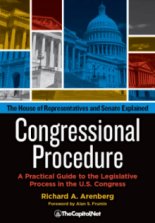Blue-Slip Resolution / Star Print / Blue Slip (CongressionalGlossary.com)
From the Congressional Glossary – Including Legislative and Budget Terms Blue-Slip Resolution / Star Print / Blue Slip MITCH RYDER – DEVIL WITH THE BLUE DRESS (Live w / lyrics) Blue-Slip Resolution: House resolution ordering the return to the Senate of a Senate bill or amendment that the House believes violates the constitutional … Read more



